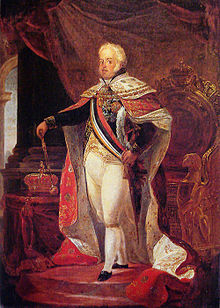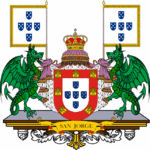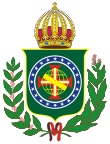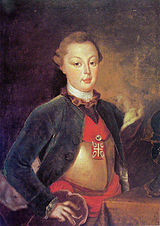- John VI of Portugal
-
John VI 
King of Portugal and the Algarves Reign 20 March 1816 – 10 March 1826 Predecessor Maria I Successor Pedro IV Duke of Braganza Reign 11 September 1788— 20 March 1816 Predecessor Joseph II Successor Pedro I Spouse Charlotte of Spain Issue Maria Teresa, Princess of Beira
Francisco António Pio, Prince of Beira
Maria Isabel, Queen of Spain
Pedro IV
Infanta Maria Francisca
Infanta Isabel Maria
Miguel I
Infanta Maria da Assunção
Infanta Ana de Jesus Maria, Duchess of LouléFull name João Maria José Francisco Xavier de Paula Luís António Domingos Rafael House House of Braganza Father Peter III of Portugal Mother Maria I of Portugal Born 13 May 1767
Lisbon, PortugalDied 10 March 1826 (aged 58)
Lisbon, PortugalBurial Dynasty of Braganza Royal Pantheon, Monastery of São Vicente de Fora, Lisbon, District of Lisbon, Portugal Religion Roman Catholicism John VI (full name: João Maria José Francisco Xavier de Paula Luís António Domingos Rafael; (13 May 1767 – 10 March 1826) was King of the United Kingdom of Portugal, Brazil and the Algarves (later changed to just King of Portugal and the Algarves, after Brazil was recognized independent in 1825). Before his accession, he bore the titles of Duke of Braganza and Duke of Beja, as well as the title of Prince of Brazil. As the Portuguese sovereign, he was also sovereign of the colonial ultramarine Portuguese Empire.
He was born in Lisbon in 1767 as an infante (Prince not heir to the throne) of Portugal. John was the 27th (or 28th according to some historians) monarch of Portugal.
Before acceeding to the Portuguese Throne, John served, since 1799, as Prince Regent of Portugal (and later as Prince Regent of the United Kingdom of Portugal, Brazil and the Algarves), due to the mental ilness of his mother, Queen Maria I.
Contents
Early life and regency
John was the second son of Queen Maria I of Portugal (known as Princess of Brazil at the time of his birth) and her husband (and uncle), King Peter III of Portugal (known as Infante of Portugal at the time of his birth). His parents ascended the throne of Portugal in 1777. John's elder brother Joseph died in 1788, so John became the heir apparent and received the title of Prince of Brazil and 18th Duke of Braganza.
In 1799 John assumed the reins of government as prince regent in the name of his widowed mother, who had declined into mental illness (perhaps due to porphyria). He retained this position until his mother's death in 1816. John had been brought up in an ecclesiastical atmosphere and, being naturally of a somewhat weak and helpless character, was ill adapted for the responsibilities he was called on to undertake. His wife, Charlotte of Spain, dominated him. In 1807, Portugal was invaded by France. At the urging of Britain, the whole Portuguese royal family fled to Brazil, accompanied by an escort of British ships. His court in exile was established in Rio de Janeiro.
King of Portugal
In 1816 John was recognized as king of Portugal after his mother's death but he continued to reside in Brazil, which he had raised to the status of a kingdom on 16 December 1815. The consequent spread of dissatisfaction in Portugal resulted in the peaceful Revolution of 24 August 1820, and the proclamation of a constitutional government, to which John swore fidelity on his return to Portugal in 1821. In the same year, and again in 1823, he had to suppress a rebellion led by his younger son Miguel, whom he was ultimately compelled to banish in 1824.
Meanwhile his elder son and heir-apparent, Peter, declared Brazilian independence from Portugal on 7 September 1822, and subsequently declared himself Emperor Peter I. John refused to recognize Brazilian independence until 29 August 1825, when he restored Peter to the succession in the belief that Brazil and Portugal would be reunited in a dual monarchy federation after his own death. John died at Lisbon on 26 March 1826, and was briefly succeeded by Peter (as King Peter IV). Recent tests made to John's intestines, which had been kept buried in a vase, demonstrated that he may have died due to arsenic poisoning. His nemesis, Napoleon I of France, may have also suffered a similar fate.[citation needed]
Marriages and descendants
John married Charlotte of Spain (25 April 1775-7 December 1830) in 1785 and had several children:
Name Birth Death Notes Maria Teresa, Princess of Beira 29 April 1793 17 January 1874 Married first her cousin Pedro Carlos de Borbón y Bragança, Infante of Spain and Portugal and second to Carlos, Infante of Spain, widower of her sister Maria Francisca. Francisco António Pio, Prince of Beira 21 March 1795 11 June 1801 Infanta Maria Isabel 19 May 1797 26 December 1818 Married Ferdinand VII, King of Spain. Peter IV of Portugal, I of Brazil 12 October 1798 24 September 1834 Stayed in Brazil after Napoleonic Wars in Spain. Proclaimed the Independence of Brazil in 1822 and became its first monarch as Emperor Peter I. He was also King of Portugal as Peter IV in 1826. Infanta Maria Francisca 22 April 1800 4 September 1834 Married Carlos, Infante of Spain (his first marriage). Infanta Isabel Maria 4 July 1801 22 April 1876 served as regent of Portugal from 1826 to 1828; died unmarried Miguel I 26 October 1802 14 November 1866 Known by the Liberals as the Usurper, he was King of Portugal between 1828 and 1834. He was forced to abdicate after the Liberal Wars. Infanta Maria da Assunção 25 June 1805 7 January 1834 died unmarried Infanta Ana de Jesus Maria, Duchess of Loulé 23 October 1806 22 June 1857 Married Nuno José Severo de Mendoça Rolim de Moura Barreto, Marquis and then Duke of Loulé and had issue. Ancestry
In popular culture
A fictionalized version of much of his life is depicted in the Brazilian movie Carlota Joaquina - Princesa do Brasil.
See also
References
 This article incorporates text from a publication now in the public domain: Chisholm, Hugh, ed (1911). Encyclopædia Britannica (11th ed.). Cambridge University Press.
This article incorporates text from a publication now in the public domain: Chisholm, Hugh, ed (1911). Encyclopædia Britannica (11th ed.). Cambridge University Press.
John VI of PortugalCadet branch of the House of AvizBorn: 13 May 1767 Died: 26 March 1826Regnal titles Preceded by
Maria IKing of the United Kingdom of
Portugal, Brazil and the Algarves
1816–1822Succeeded by
Peter IVBrazil secedes to found
the Empire of BrazilKing of Portugal and the Algarves
1822–1826Monarchs of Portugal Afonsine Dynasty Afonso I • Sancho I • Afonso II • Sancho II • Afonso III • Denis • Afonso IV • Peter I • Ferdinand I
House of Aviz House of Aviz-Beja Philippine Dynasty House of Braganza House of Braganza-Coburg Infantes of Portugal The generations indicate descent form Afonso I, and continues through the House of Aviz, the House of Bourbon through Isabella of Portugal, and the House of Braganza through Infanta Catherine, Duchess of Braganza.1st Generation 2nd Generation Infante Raimundo • Afonso II • Infante Pedro, Count of Urgell • Infante Fernando, Count of Flanders • Infante Henrique3rd Generation 4th Generation 5th Generation Infante Afonso, Lord of Leiria • Afonso IV6th Generation 7th Generation Infante Luís • Ferdinand I • Infante Afonso • Infante João, Duke of Valencia de Campos • Infante Dinis, Lord of Cifuentes8th Generation Infante Pedro • Infante Afonso • Infante Afonso • Edward I • Infante Pedro, 1st Duke of Coimbra • Infante Henrique, 1st Duke of Viseu • Infante João, Lord of Reguengos de Monsaraz • Infante Fernando, the Saint Prince9th Generation Infante Miguel^ • Infante Diogo, Constable of Portugal • Infante João • Peter V, King of Aragon • Infante João, Prince of Antioch • Afonso V • Cardinal-Infante Jaime • Infante Fernando, 2nd Duke of Viseu • Infante Duarte10th Generation Infante João, 3rd Duke of Viseu • Infante Diogo, 4th Duke of Viseu • João, Prince of Portugal • John II • Infante Duarte • Infante Diniz • Infante Simião • Infante Afonso • Manuel I11th Generation Afonso, Prince of Portugal • Infante João • Miguel da Paz, Prince of Portugal and Asturias^ • John III • Infante Luís, 5th Duke of Beja • Infante Fernando, Duke of Guarda and Trancoso • Cardinal-Infante Afonso • Henry, The Cardinal-King • Infante Duarte, 4th Duke of Guimarães • Infante António • Infante Carlos12th Generation Afonso, Prince of Portugal • Manuel, Prince of Portugal • Filipe, Prince of Portugal • Infante Dinis • John Manuel, Prince of Portugal • Infante António13th Generation 14th Generation 15th Generation Balthasar Charles, Prince of Portugal and Asturias* • Infante Francisco Fernando* • Teodósio, 1st Prince of Brazil • Afonso VI • Peter II16th Generation João, 3rd Prince of Brazil • John V • Infante Francisco, 7th Duke of Beja • Infante António • Infante Manuel, Count of Ourém •17th Generation 18th Generation none19th Generation 20th Generation Francisco António, 8th Prince of Beira • Peter I of Brazil & IV of Portugal • Miguel I • Infante Pedro Carlos* • Infante Carlos José Antonio*21st Generation 22nd Generation Pedro V • Luís I • Infante João, 8th Duke of Beja • Infante Fernando • Infante Augusto, 3rd Duke of Coimbra • Infante Leopoldo • Infante Eugénio Maria • Infante Miguel, 6th Duke of Viseu • Infante Francisco José • Infante Duarte Nuno, 25th Duke of Braganza23rd Generation Carlos I • Afonso, Prince Royal and 3rd Duke of Porto • Infante Duarte Pio, Duke of Braganza • Infante Miguel, Duke of Viseu • Infante Henrique, Duke of Coimbra24th Generation Luís Filipe, Prince Royal • Manuel II • Infante Dinis, Duke of Porto • Infante Afonso, Prince of Beira •^also an infante of Castile and León, Aragon, Sicily and Naples, *also an infante of Spain, **claimant infante, ^^only prince or infante by marriagePrinces of Brazil Infante Teodósio (1645–1653) · Infante Afonso (1653-1656) · Infante João (1688) · Infante João (1689-1706) · Infante José (1714-1750) · Infante Pedro (1760-1777) · Infante José (1777-1788) · Infante João (1788-1816) · Infante Pedro (1816-1817)The Brazilian Imperial Family Forefathers John VI of Portugal · Queen Carlota (née Infanta of Spain)
First generation Emperor Pedro I · Empress Leopoldina (née Archduchess of Austria) · Empress Amélie (née Princess of Leuchtenberg)Second generation Emperor Pedro II · Empress Teresa Cristina (née Princess of Bourbon-Two Sicilies) · Maria II of Portugal · Januária, Princess Imperial and Countess of Aquila · Princess Paula · Francisca, Princess of Joinville · Princess MariaThird generation Afonso, Prince Imperial · Pedro, Prince Imperial · Isabel, Princess Imperial · Prince Gaston of Orléans, Count of Eu · Leopoldina, Princess of Saxe-Coburg-KoharyFourth generation Pedro de Alcântara, Prince of Grão-Pará · Prince Luís · Princess Maria Pia (née Princess of Bourbon-Two Sicilies) · Prince Antônio GastãoConsorts are in italicsCategories:- Princes of Brazil
- Portuguese infantes
- Portuguese monarchs
- Portuguese royalty
- Dukes of Braganza
- Regents of Portugal
- Regents of Brazil
- Regents
- Roman Catholic monarchs
- Knights of the Garter
- Grand Croix of the Légion d'honneur
- Knights of the Golden Fleece
- Brazilian monarchs
- 19th-century Portuguese people
- 1767 births
- 1826 deaths
- Burials at the Monastery of São Vicente de Fora
- House of Braganza
- Grand Masters of the Order of the Immaculate Conception of Vila Viçosa
- Knights of the Elephant
- People of the Peninsular War
Wikimedia Foundation. 2010.


